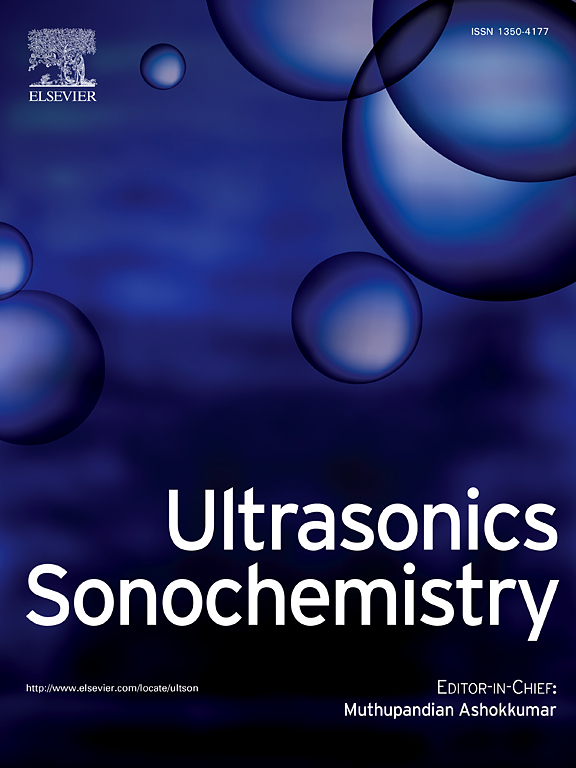Thermosonication enhanced the bioactive, antioxidant, and flavor attributes of freshly squeezed tomato juice
IF 8.7
1区 化学
Q1 ACOUSTICS
引用次数: 0
Abstract
The sterilization of freshly squeezed juices typically results in a compromise to the natural flavor, bio-active components, and nutritional value. Developing a new sterilization method for controlling the diverse effects has emerged as a significant challenge. This research aims to explore the potential application of thermosonication (TS) for freshly squeezed tomato juice. Results revealed that both TS (temperature 50, 60, and 70 ℃; time 5, 10, and 15 min) and thermal pasteurization (TP, 85 ℃/10 min) effectively inactivated microorganisms. No significant differences were observed in the basis properties (pH, total soluble solids (TSS) and titratable acidity (TA)) of tomato juice. Notably, TS effectively enhanced the juice quality, and the optimal condition is TS 60 ℃ 15 min. Its retention rates in color and suspension stability were greatly enhanced. Meanwhile, TS (60 ℃, 15 min) not only significantly increased lycopene content (42.13 %), ascorbic acid content (36.64 %), flavonoids content (33.94 %), and total phenols content (34.06 %), but also maintain a higher antioxidant capacity compared to PJ samples. Moreover, the sensory quality and volatile substances of TS treated were enhanced. It can be inferred that TS through ultrasonic cavitation ensured the microbial safety, improved nutritional value and sensory quality of tomato juice. This report provide a basis that a proper lower pasteurization temperature produced better effect in tomato juice when combined with ultrasound.
热超声增强了鲜榨番茄汁的生物活性、抗氧化和风味特性
鲜榨果汁的灭菌通常会损害其天然风味、生物活性成分和营养价值。开发一种新的灭菌方法来控制不同的影响已经成为一个重大的挑战。本研究旨在探讨热超声(TS)技术在鲜榨番茄汁中的潜在应用。结果表明:温度50、60、70℃;时间5,10和15min)和热巴氏灭菌(TP, 85℃/ 10min)有效灭活微生物。番茄汁的基本性质(pH、总可溶性固形物(TSS)和可滴定酸度(TA))无显著差异。其中,TS能有效提高果汁品质,最佳条件为TS 60℃15 min,其显色保留率和悬浮稳定性均有较大提高。同时,经60℃、15 min处理后,番茄红素含量(42.13%)、抗坏血酸含量(36.64%)、总黄酮含量(33.94%)和总酚含量(34.06%)均显著提高,抗氧化能力也较PJ样品有所提高。处理后的TS感官品质和挥发性物质均有所提高。由此可以推断,通过超声空化进行TS处理,保证了番茄汁的微生物安全性,提高了番茄汁的营养价值和感官品质。本研究为番茄汁适当降低巴氏灭菌温度与超声联合杀菌效果较好提供了依据。
本文章由计算机程序翻译,如有差异,请以英文原文为准。
求助全文
约1分钟内获得全文
求助全文
来源期刊

Ultrasonics Sonochemistry
化学-化学综合
CiteScore
15.80
自引率
11.90%
发文量
361
审稿时长
59 days
期刊介绍:
Ultrasonics Sonochemistry stands as a premier international journal dedicated to the publication of high-quality research articles primarily focusing on chemical reactions and reactors induced by ultrasonic waves, known as sonochemistry. Beyond chemical reactions, the journal also welcomes contributions related to cavitation-induced events and processing, including sonoluminescence, and the transformation of materials on chemical, physical, and biological levels.
Since its inception in 1994, Ultrasonics Sonochemistry has consistently maintained a top ranking in the "Acoustics" category, reflecting its esteemed reputation in the field. The journal publishes exceptional papers covering various areas of ultrasonics and sonochemistry. Its contributions are highly regarded by both academia and industry stakeholders, demonstrating its relevance and impact in advancing research and innovation.
 求助内容:
求助内容: 应助结果提醒方式:
应助结果提醒方式:


